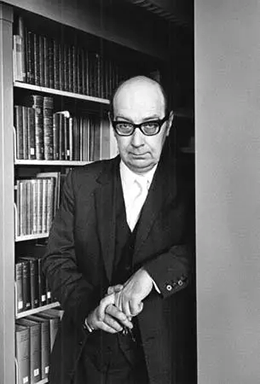Philip Larkin Society
| Philip Larkin | |
|---|---|

Photograph by Fay Godwin (1970)
|
|
| Born |
Philip Arthur Larkin 9 August 1922 Radford, Coventry, Warwickshire, England |
| Died | 2 December 1985 (aged 63) Hull, Humberside, England |
| Cause of death | Cancer of oesophagus |
| Resting place |
Cottingham municipal cemetery 53°47′00.98″N 0°25′50.19″W / 53.7836056°N 0.4306083°WCoordinates: 53°47′00.98″N 0°25′50.19″W / 53.7836056°N 0.4306083°W |
| Monuments | Bronze statue, Martin Jennings (2010), Hull Paragon Interchange Station |
| Alma mater | St John's College, Oxford |
| Occupation | Poet, librarian, novelist, jazz critic |
| Employer | University of Hull for 30 years |
| Notable work | The Whitsun Weddings (1964), High Windows (1974) |
| Parent(s) | Sydney Larkin (1884–1948), Eva Emily Day (1886–1977) |
Philip Arthur Larkin CH CBE FRSL (9 August 1922 – 2 December 1985) was an English poet, novelist and librarian. His first book of poetry, The North Ship, was published in 1945, followed by two novels, Jill (1946) and A Girl in Winter (1947), and he came to prominence in 1955 with the publication of his second collection of poems, The Less Deceived, followed by The Whitsun Weddings (1964) and High Windows (1974). He contributed to The Daily Telegraph as its jazz critic from 1961 to 1971, articles gathered in All What Jazz: A Record Diary 1961–71 (1985), and he edited The Oxford Book of Twentieth Century English Verse (1973). His many honours include the Queen's Gold Medal for Poetry. He was offered, but declined, the position of Poet Laureate in 1984, following the death of Sir John Betjeman.
After graduating from Oxford in 1943 with a first in English language and literature, Larkin became a librarian. It was during the thirty years he worked with distinction as university librarian at the Brynmor Jones Library at the University of Hull that he produced the greater part of his published work. His poems are marked by what Andrew Motion calls a very English, glum accuracy about emotions, places, and relationships, and what Donald Davie described as lowered sights and diminished expectations. Eric Homberger (echoing Randall Jarrell) called him "the saddest heart in the post-war supermarket"—Larkin himself said that deprivation for him was what daffodils were for Wordsworth. Influenced by W. H. Auden, W. B. Yeats, and Thomas Hardy, his poems are highly structured but flexible verse forms. They were described by Jean Hartley, the ex-wife of Larkin's publisher George Hartley (the Marvell Press), as a "piquant mixture of lyricism and discontent", though anthologist Keith Tuma writes that there is more to Larkin's work than its reputation for dour pessimism suggests.
...
Wikipedia
